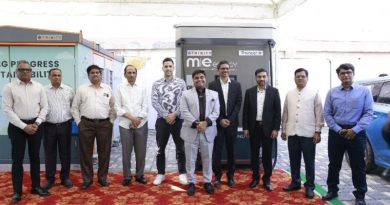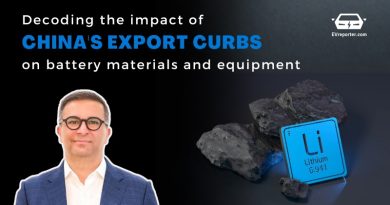Government tightens lithium-ion battery black mass export curbs | Stakeholders share perspective
Black mass—the powdery residue left after the end of life lithium-ion batteries are shredded—contains recoverable cobalt, nickel, lithium, graphite and other materials. It is classified as hazardous waste (HS Code 8549), and exporting it requires explicit permission from the Ministry of Environment, Forest & Climate Change (MoEF&CC) and a licence from the Directorate General of Foreign Trade (DGFT). Yet, multiple shredding facilities have been exporting the material as non-hazardous products.
The Central Board of Excise and Customs is aware of this practice and has put in place checks and curbs to prevent the shipment of forbidden materials through misrepresentation. The primary concern is to stop the drain of critical materials.
Setting the context
The price of blackmass is largely determined by its Cobalt content, and at present, most end-of-life lithium-ion battery feedstock still comes from mobile phone and electronic LCO batteries. It is also true that domestic facilities capable of absorbing the black mass may not offer the same prices as exports. The Indian lithium-ion battery recycling is currently divided into two segments:
- R2 recyclers – Players who engage in only Battery Dismantling and Physical separation (i.e., processing until black mass generation).
- R4 recyclers – Companies involved in Battery Dismantling, Physical Separation and Refining (i.e. Black Mass Processing).
Chinese and Korean refiners have achieved massive economies of scale, allowing them to offer higher payables for black mass while maintaining low refining costs. This has created a distorted market where Indian recyclers are lured by high export prices.
We spoke with multiple practitioners and leaders in India’s lithium-ion battery ecosystem regarding black mass exports/curbs. This write-up is a compilation of their comments and aims to provide a comprehensive perspective, presenting different points of view and recommendations on the matter.
Rahul Singh – Business Head, Exigo Recycling, noted the claims of some R2 recyclers that Indian refineries pay ~2% less on black mass, making exporting the material more profitable. However, as a strong advocate of domestic refining, he believes that the imposition of export curbs are a welcome signal to build our refining ecosystem and strengthen our recycling infrastructure.
Nitin Gupta | Co-founder & CEO – Attero
“Attero has built a capacity to refine up to 15,000 MT of battery blackmass a year, backed by proprietary technology. There is sufficient demand within India to take in all the blackmass being produced in the country. The government needs to put a stop to the export as soon as possible to avoid surrendering valuable feedstock to overseas hydrometallurgy plants in South Korea and China.”
Bhuwan Purohit | Executive Director – Rubamin
“The MoEF&CC should not issue any licenses to export black mass to shredding units (R2) or fully integrated recyclers (R4 recyclers), as data indicates that there are sufficient refining units in the country to convert all the black mass generated into critical metal compounds. The refining capacities created with government support are already short of feedstock.”
Rubamin has a blackmass refining capacity of 10,000 MTA at its Gujarat plant.
Raman Sharma | MD – Exigo Recycling
“The Critical Mineral Mission is not just a policy — it is a declaration of economic nationalism. Those opposing the export ban are, in effect, defending the old economic position, where India supplies raw materials cheaply, only to buy back finished products at premium prices.
At Exigo, we are breaking that cycle. Our Karnal facility houses a 7,600 MTA black mass refining capacity for lithium-ion, zinc-carbon, and alkaline batteries, the first in India with direct cathode-to-cathode recycling for LFP. We are building value in India, for India.”
However, some voices in the industry argue that export restrictions on black mass should be introduced in a phased manner, given that multiple R2 recyclers currently rely on exports. One recycling business owner also noted that there is no restriction on the export of materials recovered post-refining. “Black mass refining does add a significant step towards domestic value addition, but to achieve the aim of keeping valuable materials within the country, similar export curbs should also apply to refined metals and salts”, they added.
Some concerns were also expressed about the categorisation of black mass as a hazardous waste. A few people highlighted the lack of local capabilities to absorb the refined materials and produce battery-grade powders needed to reintroduce them into the lithium-ion cell value chain.
Akshay Jain | Founder – Namo E-waste Management
“We support the Government’s objective to restrict the outflow of critical minerals in the interest of national supply security. However, the recent Customs notification appears to have been issued without adequate stakeholder consultation and seemingly influenced by a limited set of players. Classifying black mass as hazardous waste is also inconsistent with its true nature as an intermediate product from R2 level recycling, serving as essential feedstock for downstream R3 & R4 Refining.”
“The current restrictions overlook the challenges faced by R2 recyclers, who form over 80% of India’s Li-ion battery recycling industry and currently receive better payables from overseas refiners than domestic ones. This may create a price monopoly for a few players, particularly in an unregulated and largely unorganised battery scrap market. Established international refiners offer much higher recovery rates, which at the moment help R2 recyclers sustain margins and reinvest in R4 level refining capabilities to support India’s critical minerals mission.”
“Further, if the aim is to prevent critical mineral outflow, similar export curbs should also apply to refined metals and salts of Lithium, Nickel, Cobalt, and Manganese to ensure consistency across the value chain. We therefore urge that any export restrictions on black mass be introduced in a phased and consultative manner to ensure fairness, market stability, and balanced industry growth.”
Gaurav Dolwani | CEO – LICO Materials
“Firstly, India needs to define the standards and formalise on what’s black mass, and the country’s overall critical mineral roadmap should be owned and managed at inter ministry level. China and Europe have defined the parameters, standardised black mass categorisation, and based import/export policies on that categorisation.”
The current payable difference between the export rates and domestic procurement is not at par, which makes it unviable for R2 recyclers to sell their product locally. Moreover, blanket export curbs on any materials containing Nickel or Cobalt pose an existential threat to a large number of small/medium players who collectively employ thousands of people directly or by extension.
If domestic R4 refiners pay a fair price within the market-determined range, there will be no incentive for R2 players to export and subject themselves to the complexity of managing export logistics.
The government has introduced an incentive policy to support critical mineral refining, which is a welcome step, as it gives R2 recyclers an opportunity to avail of the incentive and build R4 capabilities. We feel that the current export curbs stem from the commercial interests of some companies, and the authorities need to be mindful of not making decisions that crush the existing businesses with the potential to turn R4 tomorrow.”
Pratyush Sinha | Lohum
“At Lohum, we think that India has a certain domestic demand for Cobalt, and it is important that this demand is met. At this point, the demand is somewhat limited as the downstream industry is still emerging. But we expect demand to increase soon. Our suggestion would be: let’s speak to the user industries to understand their requirements, then evaluate any restrictions in a phased manner. This will ensure that both (i) the recyclers retain the flexibility to sell their products in the global market and (ii) ensuring Indian consumers don’t fall short of supply. Overall, a bit more coordination and consultation will be helpful in deciding policy here.”
Battery expert Dr SRS Prabaharan added that the CAM (cathode active material) manufacturing capabilities of Indian firms are practically non-existent at this point, which means that most of the recovered materials would again be exported out of the country, raising questions on the impact of black mass refining to help curb the outflow of critical materials.
Dr Prabaharan S.R.S | Founder & CEO – INVENTUS BATTERY ENERGY TECHNOLOGIES
“We also need to consider who is positioned to utilise the recovered Cobalt from blackmass refining operations, given that there are no legitimate producers of battery-grade NMC powder—either pre-CAM or CAM—within India as of today. Unless India steps up to build a domestic CAM production ecosystem, black mass producers can only sustain operations through exports.”
Without a clear roadmap, export curbs could inadvertently consolidate monopolistic control over black mass flows. That’s not just a supply chain issue—it’s a strategic vulnerability. India must move fast. Build CAM capacity first. Enable feedstock collection. And ensure that policy doesn’t outpace infrastructure.
However, R4 recyclers argue that they do not have to depend solely on CAM manufacturers to absorb the materials. Recovered materials find myriad applications in other domestic industries that primarily procure them directly or indirectly through an import route, an industry practitioner noted. To name some:
- Cobalt Sulphate finds mass application in the paint drier and animal feed industries.
- Nickel Sulphate is used for electroplating.
- Lithium Carbonate is procured by the pharma industry.
- Manganese Sulphate is used by the fertiliser industry.
Beyond the debate over export policy, there are also calls for forging a united industry front and formalising India’s fragmented lithium-ion recycling industry, which currently comprises of a large number of small unorganised players as well. Frameworks for black mass pricing are also required to ensure stakeholder alignment.
Rahul Jha | ADV Metal Combine
“With the launch of the National Critical Mineral Mission, there’s finally a policy window to change the current trajectory – but it will take coordination and discipline among recyclers. Indian black mass processors must formalise collection and build integrated refining capacity. As long as export authorisations remain possible, the race to the bottom will continue. Unless the sector works as one front, this will only enrich scrap aggregators while genuine refiners and national interest lose out.”
ADV produces battery-grade raw materials at its R4 recycling facility. The company is licensed to handle 2500 MT/Annum of Li-ion Battery waste.
Black Mass export ban is a strategic push towards domestic value recovery and security. However, turning the ban into an advantage would take more than the refining capabilities, believes ALN Rao, Head – Sustainability Solutions, at Recykal.
ALN Rao | Head – Sustainability Solutions, Recykal
“We need a transparent market with a fair pricing index, enforceable rewards/penalties, and end-to-end tracking to ensure provenance and accountability. An efficient market design would also entail enabling forwards/futures and indexed contracts to reduce price risk for the stakeholders.“
Recommendations:
- Map national black mass volumes and set interim technical standards.
- Launch 3–5 accredited assay labs and a pilot digital chain-of-custody (unique IDs, tamper sensors, machine-readable assays, permissioned ledger) in a high-volume region.
- Seed one public–private “anchor” refinery and announce a provisional “India Black Mass Index”.
- Accountability: Clear stakeholder obligations, performance-linked premiums, and penalties and mandatory third-party audits.
In Conclusion
Building, fully utilising domestic refining capacities, and ensuring national resource security are non-negotiable. The path lies in immediate action on three fronts: formalising the fragmented recycling sector through technical standards and digital traceability, establishing a transparent black mass pricing index in India to ensure fair value distribution, and promoting upstream investment in CAM manufacturing to prevent refined battery-grade materials from taking a different route abroad. Success will depend on creating a self-sustaining domestic market where industry discipline and policy together secure India’s critical mineral future.
This article was first published in EVreporter Nov 2025 magazine.
Subscribe today for free and stay on top of latest developments in EV domain.






